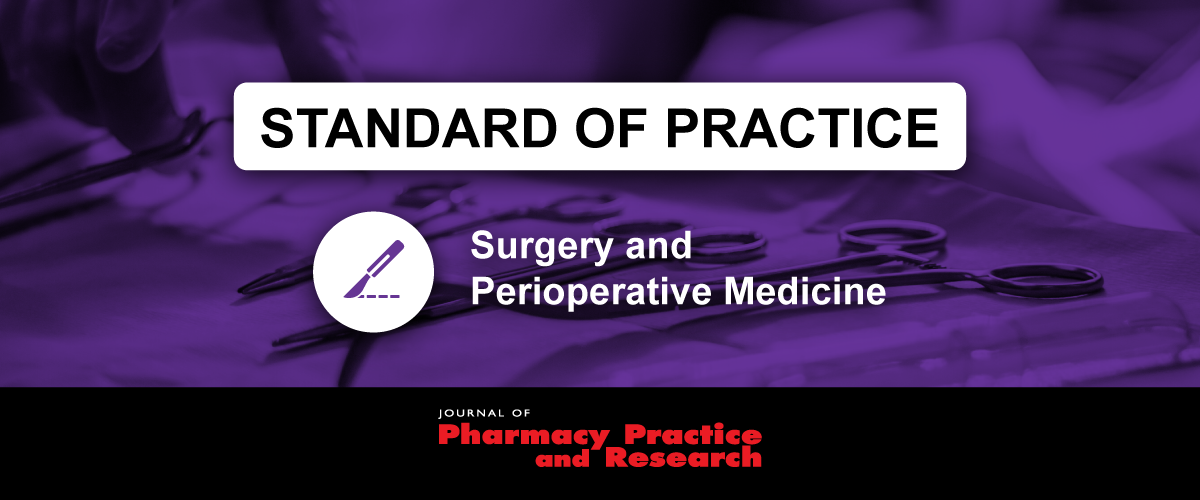SHPA releases Australian-first pharmacy practice standard for surgical settings
The first Australian pharmacy practice standard for surgery and perioperative medicine has been released by the Society of Hospital Pharmacists of Australia (SHPA), setting benchmark patient-to- pharmacist ratios and identifying emerging and essential services to improve safety as the number and complexity of surgeries continue to grow.
The Standard of practice in surgery and perioperative medicine for pharmacy services, published in the April 2022 issue of the Journal of Pharmacy Practice and Research (JPPR) by members of the SHPA Surgery and Perioperative Medicine Working Group, is the second successive Australian first, following the release of SHPA’s Standard of practice in cardiology for pharmacy services in February.
Janelle Penno, SHPA Surgery and Perioperative Medicine Leadership Committee Chair, says the standard is crucial, as surgery becomes more common in older patients with multiple comorbidities and polypharmacy.
‘Since 2013–2014, elective surgery admissions have increased on average by 2.1% each year – with around two days hospital admission required for elective surgery and one week for emergency surgery – and people aged 65 years and over accounted for approximately one in three surgical admissions.
‘Our new standard builds on growing evidence of the impact expert pharmacists can have on reducing adverse events and harm caused by surgery and perioperative medicine, by leading emerging and essential services tailored to the size and scope of Australian hospitals.
‘This includes, for the first time, outlining the role of the Perioperative Medicine Pharmacist – a key contributor across all settings during the perioperative period – which complements the surgical pharmacist role that is more familiar.
‘These emerging services include Partnered Pharmacist Medication Charting, smoking cessation intervention and pharmacist involvement in perioperative allergy testing clinics, as well as quality improvement activities such as opioid/analgesic and antimicrobial stewardship programs.’
The Standard of practice in surgery and perioperative medicine for pharmacy services highlights the similarities and differences between Surgery Pharmacists and Perioperative Medicine Pharmacists, who may be required to assist with the supply of medicines or medicines information in time-sensitive, high-risk, or limited evidence situations, often facing issues with medicine shortages, accessibility and cost.
Reflecting the diverse needs of patients in different settings, recommended ratios of patients to 1 FTE pharmacist for five-day clinical pharmacy services range from 10 for post-anaesthetic and short stay care, to 20-30 for lower risk surgeries such as breast and ear nose and throat (ENT).
Ms Penno, Perioperative Pharmacist at the Peter MacCallum Cancer Centre in Melbourne, says three major factors determine staffing levels for clinical pharmacy services.
‘The range of clinical pharmacy services provided, the complexity of care required and patient throughput of the hospital or health service influence optimal staffing levels,
‘Advances in technology and clinical practice have resulted in shorter hospital stays and surgery being performed for previously inoperable conditions, while an ageing population results in more surgical patients with complex comorbidities, polypharmacy and a higher dependence on medicines.
‘Consequently, we increasingly see surgical and perioperative specialities with higher throughput, acuity and complex older patients that will require lower patient-to-pharmacist ratios.’
SHPA Chief Executive Kristin Michaels says the task now is to progress the adoption of this Standard, particularly as the expertise of Surgery and Perioperative Medicine Pharmacists is required to support increased surgical activity following COVID-19 restrictions.
‘On behalf of the Hospital Pharmacy profession and our multidisciplinary peers I thank former SHPA Surgery and Perioperative Medicine Leadership Committee Chair Thuy Bui and all members of the Working Group for steering this important project.
‘We look forward to advocating for the importance of evidence-based staffing levels and service scope through SHPA to minimise preventable medication-related harm before, during and after surgery.’


